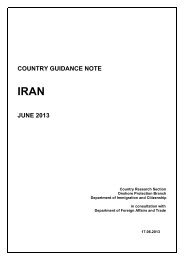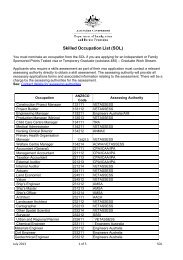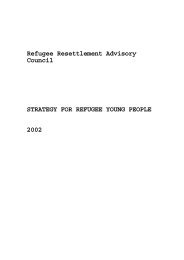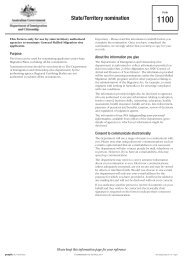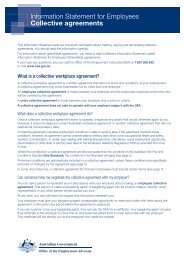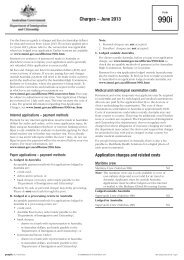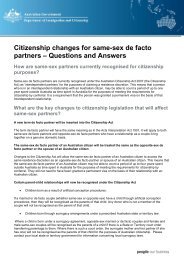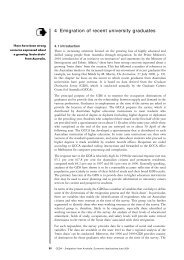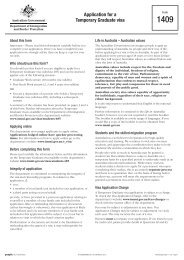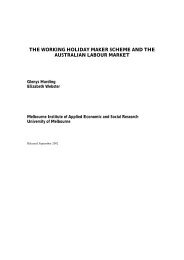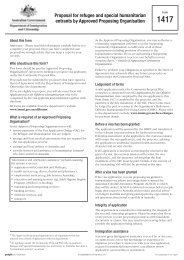Evaluation of the Integrated Humanitarian Settlement Strategy (IHSS)
Evaluation of the Integrated Humanitarian Settlement Strategy (IHSS)
Evaluation of the Integrated Humanitarian Settlement Strategy (IHSS)
You also want an ePaper? Increase the reach of your titles
YUMPU automatically turns print PDFs into web optimized ePapers that Google loves.
A fur<strong>the</strong>r consequence <strong>of</strong> inadequate notice <strong>of</strong> <strong>the</strong> entrants’ arrival is that <strong>the</strong> case may not be linked<br />
to o<strong>the</strong>r essential services in a timely manner. It may, for example, be necessary for HFS to be<br />
provided before <strong>the</strong> family arrives in order for <strong>the</strong>m to be accommodated in <strong>the</strong> proposers’ home. If<br />
nei<strong>the</strong>r <strong>the</strong> PS provider nor DIMIA is aware <strong>of</strong> an impending arrival, it is not possible for such a<br />
linkage to be made.<br />
Not all proposers receive PS support<br />
Not all proposers receive PS support. This is for three reasons:<br />
There has not always been a seamless process for linking PS service providers with proposers<br />
following grant <strong>of</strong> a visa. In <strong>the</strong> past this meant that some cases only came to attention through<br />
ad hoc means, such as if <strong>the</strong>y happened to contact ano<strong>the</strong>r agency. This gap has now been<br />
closed and checks are in place to identify <strong>the</strong>se cases so that <strong>the</strong>y are linked with PS services<br />
shortly after <strong>the</strong> entrants arrive onshore. The number <strong>of</strong> cases affected in this way is diminishing.<br />
As described above, <strong>the</strong> contact details <strong>of</strong> proposers may be inaccurate by <strong>the</strong> time <strong>of</strong> referral to<br />
<strong>the</strong> PS provider. This may make it difficult or impossible for <strong>the</strong> proposer to be contacted.<br />
Where <strong>the</strong> proposer is a group or organisation, which has proposed on behalf <strong>of</strong> an individual, it<br />
may be unclear who (if anyone) is going to provide support to <strong>the</strong> entrants. This is compounded<br />
by groups for whom <strong>the</strong> only contact point is a PO Box. In <strong>the</strong>se instances it is difficult – or<br />
impossible – for <strong>the</strong> PS provider to provide effective assistance.<br />
PS does not provide support to entrants <strong>the</strong>mselves<br />
As <strong>the</strong> PS service is provided to <strong>the</strong> proposer, ra<strong>the</strong>r than <strong>the</strong> entrant, it is effectively at arm’s length.<br />
As such, PS does not assist with <strong>the</strong> entrant’s material needs.<br />
The benefits <strong>of</strong> PS are largely dependent on <strong>the</strong> ability <strong>of</strong> <strong>the</strong> proposer. If <strong>the</strong> proposer has significant<br />
financial means and a reasonable degree <strong>of</strong> functioning within society, <strong>the</strong>n PS will provide a useful<br />
service in informing <strong>the</strong>m <strong>of</strong> <strong>the</strong>ir responsibilities as a proposer. If, on <strong>the</strong> o<strong>the</strong>r hand, <strong>the</strong> proposer<br />
does not have <strong>the</strong> capacity to fulfil <strong>the</strong>ir responsibilities, <strong>the</strong>n PS provides no tangible benefit to <strong>the</strong>m<br />
or <strong>the</strong> entrants. In particular, proposers who sponsor very large numbers <strong>of</strong> cases would experience<br />
very little benefit from receiving <strong>the</strong> same set <strong>of</strong> information again. At <strong>the</strong> same time <strong>the</strong> large number<br />
<strong>of</strong> proposals which <strong>the</strong> proposer is supporting may mean that <strong>the</strong> material needs <strong>of</strong> <strong>the</strong> entrant are not<br />
met. PS in its current form does not serve to address this.<br />
Fur<strong>the</strong>r PS is dependent on <strong>the</strong> service provider being able to deliver <strong>the</strong> service to <strong>the</strong> proposer. As<br />
noted above, <strong>the</strong>re is a range <strong>of</strong> reasons why <strong>the</strong> proposers may not receive this service and why,<br />
when <strong>the</strong>y do, <strong>the</strong> flow-on benefits may be less than adequate.<br />
In its current form PS provides very limited benefit to <strong>the</strong> proposers, and <strong>the</strong> resources may be better<br />
used in assisting <strong>the</strong> proposed entrants directly.<br />
5.5.5 Options for PS<br />
Clearly as it stands <strong>the</strong> PS service is not working. As humanitarian visa allocations revert from<br />
unneeded TPVs to SHPs, <strong>the</strong> number <strong>of</strong> proposed entrants will increase. The scale <strong>of</strong> <strong>the</strong> problem<br />
facing DIMIA and PS providers in meeting <strong>the</strong> needs <strong>of</strong> <strong>the</strong>se entrants will likewise continue to grow.<br />
Should <strong>the</strong>se problems not be addressed, it is likely that new entrants in some emerging communities<br />
will experience increasing disadvantage.<br />
55<br />
<strong>Evaluation</strong> <strong>of</strong> <strong>the</strong> <strong>Integrated</strong> <strong>Humanitarian</strong> <strong>Settlement</strong> <strong>Strategy</strong> 27 May 2003



